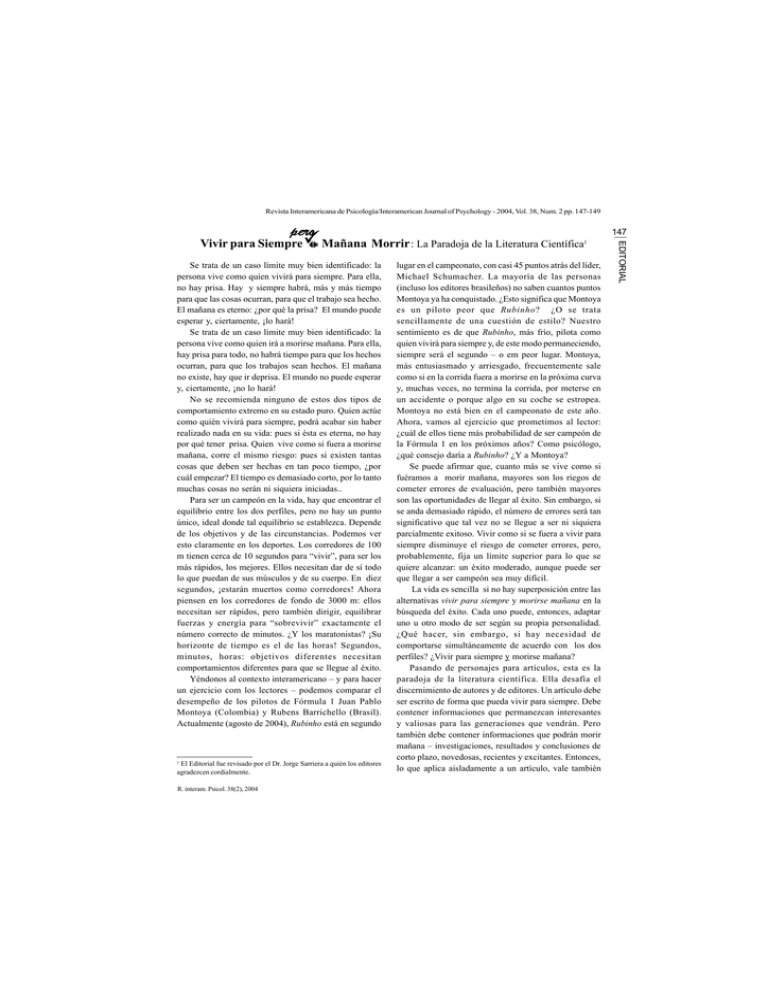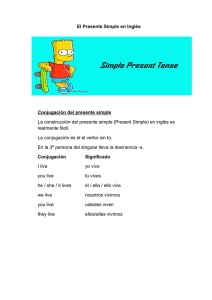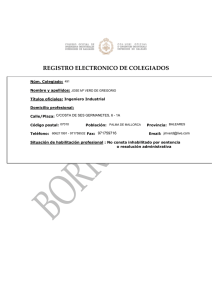Vivir para Siempre Mañana Morrir: La Paradoja de la Literatura
Anuncio

Revista Interamericana de Psicología/Interamerican Journal of Psychology - 2004, Vol. 38, Num. 2 pp. 147-149 147 Mañana Morrir : La Paradoja de la Literatura Científica Se trata de un caso límite muy bien identificado: la persona vive como quien vivirá para siempre. Para ella, no hay prisa. Hay y siempre habrá, más y más tiempo para que las cosas ocurran, para que el trabajo sea hecho. El mañana es eterno: ¿por qué la prisa? El mundo puede esperar y, ciertamente, ¡lo hará! Se trata de un caso límite muy bien identificado: la persona vive como quien irá a morirse mañana. Para ella, hay prisa para todo, no habrá tiempo para que los hechos ocurran, para que los trabajos sean hechos. El mañana no existe, hay que ir deprisa. El mundo no puede esperar y, ciertamente, ¡no lo hará! No se recomienda ninguno de estos dos tipos de comportamiento extremo en su estado puro. Quien actúe como quién vivirá para siempre, podrá acabar sin haber realizado nada en su vida: pues si ésta es eterna, no hay por qué tener prisa. Quien vive como si fuera a morirse mañana, corre el mismo riesgo: pues si existen tantas cosas que deben ser hechas en tan poco tiempo, ¿por cuál empezar? El tiempo es demasiado corto, por lo tanto muchas cosas no serán ni siquiera iniciadas.. Para ser un campeón en la vida, hay que encontrar el equilibrio entre los dos perfiles, pero no hay un punto único, ideal donde tal equilibrio se establezca. Depende de los objetivos y de las circunstancias. Podemos ver esto claramente en los deportes. Los corredores de 100 m tienen cerca de 10 segundos para “vivir”, para ser los más rápidos, los mejores. Ellos necesitan dar de sí todo lo que puedan de sus músculos y de su cuerpo. En diez segundos, ¡estarán muertos como corredores! Ahora piensen en los corredores de fondo de 3000 m: ellos necesitan ser rápidos, pero también dirigir, equilibrar fuerzas y energía para “sobrevivir” exactamente el número correcto de minutos. ¿Y los maratonistas? ¡Su horizonte de tiempo es el de las horas! Segundos, minutos, horas: objetivos diferentes necesitan comportamientos diferentes para que se llegue al éxito. Yéndonos al contexto interamericano – y para hacer un ejercicio com los lectores – podemos comparar el desempeño de los pilotos de Fórmula 1 Juan Pablo Montoya (Colombia) y Rubens Barrichello (Brasil). Actualmente (agosto de 2004), Rubinho está en segundo 1 El Editorial fue revisado por el Dr. Jorge Sarriera a quién los editores agradezcen cordialmente. R. interam. Psicol. 38(2), 2004 lugar en el campeonato, con casi 45 puntos atrás del líder, Michael Schumacher. La mayoría de las personas (incluso los editores brasileños) no saben cuantos puntos Montoya ya ha conquistado. ¿Esto significa que Montoya es un piloto peor que Rubinho? ¿O se trata sencillamente de una cuestión de estilo? Nuestro sentimiento es de que Rubinho, más frío, pilota como quien vivirá para siempre y, de este modo permaneciendo, siempre será el segundo – o em peor lugar. Montoya, más entusiasmado y arriesgado, frecuentemente sale como si en la corrida fuera a morirse en la próxima curva y, muchas veces, no termina la corrida, por meterse en un accidente o porque algo en su coche se estropea. Montoya no está bien en el campeonato de este año. Ahora, vamos al ejercicio que prometimos al lector: ¿cuál de ellos tiene más probabilidad de ser campeón de la Fórmula 1 en los próximos años? Como psicólogo, ¿qué consejo daría a Rubinho? ¿Y a Montoya? Se puede afirmar que, cuanto más se vive como si fuéramos a morir mañana, mayores son los riegos de cometer errores de evaluación, pero también mayores son las oportunidades de llegar al éxito. Sin embargo, si se anda demasiado rápido, el número de errores será tan significativo que tal vez no se llegue a ser ni siquiera parcialmente exitoso. Vivir como si se fuera a vivir para siempre disminuye el riesgo de cometer errores, pero, probablemente, fija un límite superior para lo que se quiere alcanzar: un éxito moderado, aunque puede ser que llegar a ser campeón sea muy difícil. La vida es sencilla si no hay superposición entre las alternativas vivir para siempre y morirse mañana en la búsqueda del éxito. Cada uno puede, entonces, adaptar uno u otro modo de ser según su propia personalidad. ¿Qué hacer, sin embargo, si hay necesidad de comportarse simultáneamente de acuerdo con los dos perfiles? ¿Vivir para siempre y morirse mañana? Pasando de personajes para artículos, esta es la paradoja de la literatura científica. Ella desafía el discernimiento de autores y de editores. Un artículo debe ser escrito de forma que pueda vivir para siempre. Debe contener informaciones que permanezcan interesantes y valiosas para las generaciones que vendrán. Pero también debe contener informaciones que podrán morir mañana – investigaciones, resultados y conclusiones de corto plazo, novedosas, recientes y excitantes. Entonces, lo que aplica aisladamente a un artículo, vale también EDITORIAL Vivir para Siempre 1 EDITORIAL 148 para el periódico científico. Este, igualmente, necesita vivir para siempre, pero algunas de sus partes deben asumir el riesgo de morir mañana. Felizmente, hay editores que construyen un fascículo reuniendo varios artículos de modo que, muchas veces, hay una cierta libertad para separar las partes del morirse mañana y del vivir para siempre. Incidentalmente, este número de la Revista Interamericana de Psicología ilustra tal punto cuando presenta una interesante parte vivir-parasiempre histórica. Abrigar la historia de la Ciencia es otro importante papel de la literatura científica. Muchas gracias por acompañarnos hasta este punto. Esperamos que haya encontrado estímulos intelectuales que le ayuden a aconsejar atletas pilotos de Fórmula 1 – parece que ellos necesitan preocuparse más con el morirse mañana que con el vivir para siempre. También es posible que usted tenga algo que decir a los editores científicos: el secreto es equilibrar el contenido de los fascículos, incluyendo algunas partes que vivirán para siempre y otras que van a morir mañana. Tendrán, así, un resultado equilibrado con las dos partes. Sin embargo nosotros, editores, también le podremos decir algo a usted, psicólogo, investigador y autor: ¡Por favor, ayúdenos! Escriba artículos que puedan, simultáneamente, vivir para siempre y morirse mañana. Piotr Trzesniak Editor Ejecutivo Sílvia Helena Koller Editora R. interam. Psicol. 38(2), 2004 149 Tomorrow to Die : A Paradox of the Scientific Literature It is a quite well identified limiting case: persons that live like they would live forever. For them, there is no hurry at all: there will always be more and more time for things to happen, for work to be done. Tomorrow is eternal, hurry what for? The world can wait, and it surely will! It is a quite well identified limiting case: persons that live like they would die tomorrow. For them, everything has to be done in a hurry, right now: there will be no time at all for things to happen, for work to be done. There is no tomorrow, hurry must be. The world cannot wait, and surely will not! Both behaviors are not recommended in their pure state. Those who live like they would live forever may not achieve anything in their life: after all, if life is eternal, there is no reason for being in a hurry. On the other hand, people who live like they would die tomorrow may also not achieve anything: after all, there are so many things to do, which one is to be tackled first? Time is too short and no task is even started. To be a champion in life, one has to balance the two profiles, but there is not a single, optimal, balancing point. It depends. It depends on the goals and on the circumstances. This may be clearly seen in sports. A 100 m runner has about 10 seconds to “live”, to be the fastest, the best. The runners must take everything they can get out of their muscles and their bodies. In ten seconds, they will be dead as runners! Now think of the 3000 m dash: one has to be fast, but has also to manage, to balance force and energy to “survive” for exactly the right number of minutes. And how about the marathoners? Their time horizon is hours! Seconds, minutes, or hours: different goals, different behaviors needed to achieve success. Staying within the Interamerican context - and as an exercise to the readers - let us compare the behaviour of Formula 1 drivers Juan Pablo Montoya (from Colombia) and Rubens Barrichello (from Brazil). Currently (August, 2004), Rubinho is second in championship, about 45 points behind the first, Michael Schumacher. Most people (including the Brazilian editors) do not even know how many points Montoya already has. Does this mean that Montoya is a worse driver than Rubinho? Or is it merely a matter of style? Our feeling is that Rubinho, the cold pilot, drives like he would live forever and, staying this way, he will be eternally second - or worse. Montoya, the intrepid and enthusiastic pilot, frequently starts like the race would die on the next curve, and many times he does not finish, because he gets involved in an accident or because something breaks in his car. He is not well positioned in this year’s championship. Now, the exercise we promised to the readers: who of the two is more likely to become Formula 1 champion in the years to come? As a R. interam. Psicol. 38(2), 2004 psychologist, what advice would you give to Rubinho? And what about Montoya? One may say that, the more you live like you would die tomorrow, the greater is your risk of making errors of judgment, but also the greater are your odds to achieve success. However, if you go too fast, the number of errors will be so large you may not even be partially successful. To live like you would live eternally lessens the risk of making errors, but probably sets an upper limit for what you may achieve: a moderate success, yes, but the championship may become very hard to get. Life is easy if there is no overlap between the live like you would die tomorrow and the live like you would live forever patterns to achieve success. People may then adapt one or the other way of living to their own personality. But what if one has to fit simultaneously in both profiles? To live forever and to die tomorrow? Transferred from persons to articles, this is the paradox of scientific literature. It defies the discernment of editors and of authors. A paper must be written in such way that it will live forever. It has to contain information that will remain interesting and valuable for the generations to come. But it also has to contain aspects that may die tomorrow hot, recent, exciting short-term research, results, and conclusions. Now, what applies to a single article, also applies to a scientific journal. It also has to live forever, but at least some parts of it must take the risk of dying tomorrow. Fortunately, editors have several papers to put together in an issue, so they sometimes have more freedom to separate the dying tomorrow from the living forever part. Incidentally, this Interamerican Journal of Psychology issue is an example of that, presenting a nice to-live-forever historical part. To shelter the history of Science is another important role of scientific literature. Thank you for joining us so far. We hope that you found food for thought on advising runners and Formula 1 drives - it seems they have to be more concerned with dying tomorrow than with living forever. You may also, perhaps, have something to say to scientific editors: the secret is to balance the content of the issues, including some parts that will live forever and others that are just waiting for tomorrow to die. The result, in this case, will have both aspects. Now we, the editors, may also say something to you, psychologist, researcher, and author: please, help us! Write papers that will live forever and also die tomorrow. Piotr Trzesniak Editor Ejecutivo Sílvia Helena Koller Editora EDITORIAL To Live Forever

